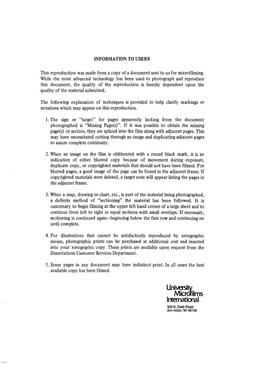| dc.contributor.author | Irby, Leilani Mcclain, | en_US |
| dc.date.accessioned | 2013-08-16T12:28:54Z | |
| dc.date.available | 2013-08-16T12:28:54Z | |
| dc.date.issued | 1983 | en_US |
| dc.identifier.uri | https://hdl.handle.net/11244/5121 | |
| dc.description.abstract | Although the study did not identify role conflict and role ambiguity as factors which influence the emotional responses of registered nurse students to the experience of baccalaureate education, the concept of role stress requires further investigation before its influence can be disregarded. | en_US |
| dc.description.abstract | The registered nurse students did not report significantly more role conflict and role ambiguity than the generic students. There were small, but significant, positive correlations among role conflict, role ambiguity, and stress. Stress and semester grade point average were negatively correlated to a moderate degree. | en_US |
| dc.description.abstract | The problem for this study is: Do registered nurse students in baccalaureate nursing programs report more role conflict and role ambiguity than generic students when both kinds of students are experiencing similar learning activities? The relationships among role conflict, role ambiguity, stress, and semester grade point averages were also examined. | en_US |
| dc.description.abstract | The study sample consisted of thirty-four registered nurse students and three groups of thirty-four generic students randomly selected from senior nursing students at four universities in Oklahoma which admit both types of students to their baccalaureate nursing programs. Three study instruments were used: a demographic inventory; Rizzo, House, and Lirtzman's Role Conflict and Role Ambiguity Scale; and Organ's Stress Scale. Data were analyzed using one-way analysis of variance, correlational procedures, and Hotelling's T('2). | en_US |
| dc.description.abstract | Registered nurse students in baccalaureate nursing programs have been characterized as hostile, angry, and resentful (Hillsmith, 1978; Woolley, 1978). | en_US |
| dc.description.abstract | Nursing educators have attributed registered nurse students' feelings and behavior to resistance to change, conflict between values systems, and culture shock (Shane, 1980). Registered nurse students identify anger about the "professional" nurse--"technical" nurse dichotomy and about the personal sacrifices they are forced to make in order to return to school as the reasons for their negative feelings (Hillsmith, 1978). | en_US |
| dc.format.extent | ix, 96 leaves ; | en_US |
| dc.subject | Health Sciences, Nursing. | en_US |
| dc.title | Role conflict and ambiguity among baccalaureate nursing students. | en_US |
| dc.type | Thesis | en_US |
| dc.thesis.degree | Ph.D. | en_US |
| dc.thesis.degreeDiscipline | Jeannine Rainbolt College of Education | en_US |
| dc.note | Source: Dissertation Abstracts International, Volume: 44-02, Section: B, page: 0455. | en_US |
| ou.identifier | (UMI)AAI8314771 | en_US |
| ou.group | Jeannine Rainbolt College of Education | |
